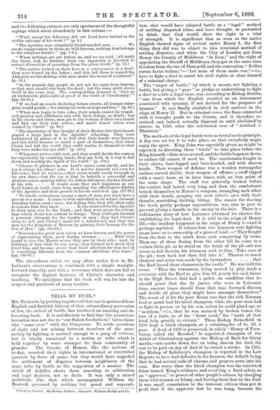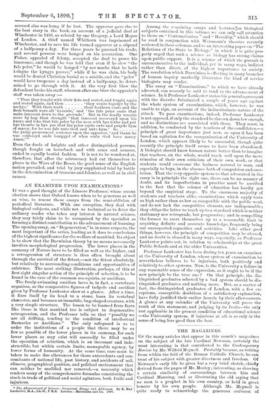TRIAL BY DUEL.*
MR. NE ILsoN, by putting together all that can be gathered from English and Scottish history of that extraordinary perversion of law, the ordeal of battle, has produced an amusing and in- teresting book. It is satisfactory to find that this pernicious invention was not due to "our Saxon forefathers," bat to those who " came over " with the Conqueror. To settle questions of right and law arising between members of the same society by fighting, is natural enough to a gang of robbers, but is wholly unnatural to a nation or tribe which is held together by some stronger tie than community of plunder. The Greeks of Homer, like the nations of to-day, asserted their rights in international or intertribal quarrels by force of arms ; but they would have regarded the settlement of disputes between neighbours of the same tribe by battle as the suggestion of a maniac. The shield of Achilles shows them resorting to arbitration and legal decision, not to duels. It was only a mixed multitude, like that which accompanied William the Bastard, governed by nothing but greed and supersti- • Trial by Combat. By George Neilson. Glasgow : William Hodge and Co.
tion, that would have adopted battle as a " legal " method of settling disputed titles, and have thought, or pretended to think, that God would show the right in a trial of strength. It is significant that as soon as the native English showed signs of revival under Henry I., the first thing they did was to object to this irrational method of settling disputes ; and when the City of London got from Henry the County of Middlesex "in ferm," and the right of appointing the Sheriff of Middlesex, they got at the same time freedom from the tax of Danegeld, and the concession, " Nullus eorum faciat bellum,"—" Let none of them make war,"—i.e., have to fight a duel to assert his civil rights, or clear himself of a criminal charge.
The " wager of battle," by which is meant, not fighting a battle, but giving a " gage " or pledge or undertaking to fight a duel to settle a legal issue, was, according to Bishop Stubbs, " one from which the English recoiled as an instrument associated with tyranny, if not devised for the purposes of tyrants." It was finally abolished in civil matters in the reign of Henry II. But in criminal cases, the fines connected with it brought profit to the Crown, and it therefore re- mained, and, indeed, actually lingered on until abolished by statute in 1819, after the celebrated case of "Ashford v. Thornton."
The methods of the legal battle were as brutal as its principle. A day was set for it to take place, so that everybody might enjoy the sport. King John was especially given, as might be expected, to directing these "trials" to take place before the King himself,—lists were erected, and the battle began at dawn, to endure till sunset, if need be. The combatants fought in their shirts, bare-legged and bare-headed, and with shaven heads. Their weapon of defence was a wooden rectangular snrface•curved shield ; their weapon of offence, a staff tipped with a ram's horn, or in later times, with an iron point of the same shape. The staff was generally broken before the combat had lasted very long, and then the combatants betook themselves to Nature's weapons, strangling each other with their hands, gouging out each other's eyes with their thumbs, scratching, kicking, biting. The reason for shaving the head, partly perhaps superstitious, was also in part to prevent giving a handle to the enemy in the hair. There is a well-known story of how Leicester obtained its charter dis- establishing the legal duel. It is told in the reign of Henry III.—the incident happened in the reign of Henry I.—and is perhaps mythical. It relates how two kinsmen were fighting on an issue as to ownership of a piece of land :—" They fought from the first to the ninth hour, each conquering by turns.
Then one of them fleeing from the other till he came to a certain little pit, as he stood on the brink of the pit and was about to fall therein, his kinsman said to him, Take care of the pit ; turn back lest thou fall into it.' Thereat so much clamour and noise was made by the bystanders that the Earl heard these clamours in the castle." He was told the cause. " Then the townsmen, being moved by pity, made a covenant with the Earl to give him 3d. yearly for each house in the High Street that had a gabel, on condition that he
should grant that the 24 jurors who were in Leicester from ancient times should from that time forward, discuss and decide all pleas they might have amongst themselves." The worst of it for the poor Saxon was that the rich Norman lord or monk had his hired champion, while the poor man had to fight in person or by his son, unless he could plead age or "mayhem,"—i.e., that he was maimed by broken bones, the loss of a limb, or of the " front teeth," for " teeth of that kind help greatly to victory." Thus, Bishop Swinefield in 1289 kept a hired champion, at a retaining-fee of 6s. 8d. a year. A deed of 1258 is preserved, in which " Henry of Fern- burey, called the Marshal," is appointed champion of the Abbot of Glastonbury against the Bishop of Bath for thirty marks,—ten marks down, five on being shaven for duel, the rest to be paid on day of duel if he struck a stroke. In 1355, the Bishop of Salisbury's champion is reported in the Law Reports to have had defaults in his harness, the default being that he had several rolls of charms and prayers sewn into his coat. But worse than the hired champion was the convicted felon turned King's evidence, and receiving a fixed salary as an " approver," or prover of other people's crimes, by charging them with treason or felony, and forcing them thus to the duel. It was small consolation to the innocent citizen thus put in peril that if the approver lost he was hung, because the
accused also was hung if he lost. The approver gave rise to the best story in the book, an account of a judicial duel at Winchester in 1456, as related by one Gregory, a Lord Mayor of London. A thief named Whithorn was imprisoned at Winchester, and to save his life turned approver at a stipend of a halfpenny a day. For three years he pursued his trade, and several persons were hanged on his accusation. One Fisher, appealed of felony, accepted the duel to prove his innocence, and though he was told that even if he slew " the fals peler," he would be hanged "by soo moche that he hath
i-slayne the kyngys prover," while if he was slain, his body,
would be denied Christian burial as a suicide, and the " peler ' would have twopence a day instead of a halfpenny, he deter- mined to go through with it. At the very first blow the defendant broke his staff, whereon after one blow the appealer's staff was taken away
Then they fought with their fists and rested, and fought again and rested again, and then 'they wente togedyr by the neckys.' With their teeth their leathern coats and the flesh beneath were all 'to-rents,' and ' the fals peler caste that meke innocent down to the grownde.' But in the deadly wrestle more by hap than strength 'that innocent recoveryd upon" his kneys and toke that fals peler by the nose with hys tethe and put hys thombe in hys yee that the peler cryde owte and prayde hym of marcy, for he was fals unto God and unto hym.' So the judge pronounced sentence upon the approver, and thenn he was confessyd ande hanggyd of whoa soule God have marcy Amen.' "
Even the duels of knights and other distinguished persons, though fought on horseback and with arms and armour, ended in equally bestial fashion. It is not to be wondered at, therefore, that after the aristocracy had cut themselves to pieces in the Wars of the Roses, the good sense of the English nation prevailed, and trial by jury supplanted trial by battle in the determination of treasons and felonies, as well as in civil causes.



































 Previous page
Previous page